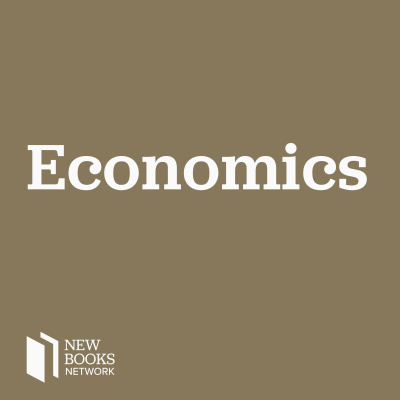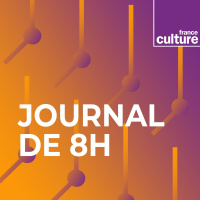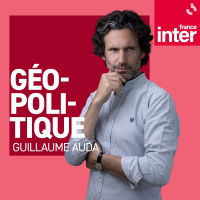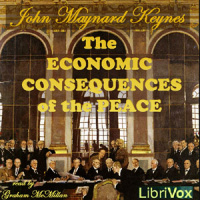Sinopsis
Interviews with Economists about their New Books
Episodios
-
Howard Yaruss, "Understandable Economics: Because Understanding Our Economy Is Easier Than You Think and More Important Than You Know" (Prometheus Books, 2022)
31/08/2022 Duración: 56minIncomes are stagnating, middle-class jobs are disappearing, economic growth is slowing, and the meager gains are mostly going to those who are already wealthy. More Americans than ever are frustrated by the direction in which we are headed. Understandable Economics: Because Understanding Our Economy Is Easier Than You Think and More Important Than You Know (Prometheus, 2022) aims to replace this frustration with a practical understanding of our economy and empower readers to identify and advocate for a better approach to the problems we face. In this entertaining and informative guide, author Howard Yaruss breaks down our economic system in a straightforward way, avoiding jargon, formulas, graphs, and other technical material so common in books on this subject. Instead, he creates a compelling and comprehensive picture of our economy using accessible analogies, real-world observations, and entertaining anecdotes. Understandable Economics will enable readers to answer questions such as: Why is inequality soar
-
Paul Oyer, "An Economist Goes to the Game: How to Throw Away $580 Million and Other Surprising Insights from the Economics of Sports" (Yale UP, 2022)
29/08/2022 Duración: 57minShould you train your kid to become a pro athlete? Why do Koreans dominate women’s golf? Why should ticket scalpers get more respect? Why are pro sports plagued by doping scandals and ruinous strikes? Learn the answers to these questions and more in my conversation with author Paul Oyer and sports economist Daniel Rascher about Paul’s new book An Economist Goes to the Game: How to Throw Away $580 Million and Other Surprising Insights from the Economics of Sports (Yale UP, 2022). Author Paul Oyer is the Mary and Rankine Van Anda Entrepreneurial Professor, professor of economics, and senior associate dean for academic affairs at the Stanford University Graduate School of Business. His academic research studies the economics of organizations and human resource practices, including the use of stock options plans, non-cash benefits, and the development of the gig economy. His previous books include Roadside MBA, which extracts business lessons from the experiences of small businesses across the US, and Everything
-
Mélissa Mialon, "Big Food & Co" (Thierry Souccar Editions, 2021)
26/08/2022 Duración: 51minIn the 1960s and 1970s, the exposure of Big Tobacco’s aggressive lobbying and internal efforts to obscure science showcasing the harmful effects of smoking changed U.S. public opinion of the industry and of product safety protocols, both of which had largely obscured these harms from public view for decades. Public awareness grew, triggering regulation on disclosure related to political influencing strategies, marketing tactics, and transparency regarding the devastating toll of tobacco products on many communities, including and especially children. As similar approaches to assessing the public health impacts of Big Oil and Big Pharma, among other industries, have gained traction in recent decades, Dr. Mélissa Mialon’s new book, Big Food & Co (Thierry Souccar Editions, 2021), adds the amalgamation of multinationals and transnational supply chains that make up Big Food, to that list. Rising health inequities across race, class, and geography are subtle, yet central themes throughout Dr. Mialon’s meticulous ac
-
Becky O'Connor, "The ESG Investing Handbook: Insights and Developments in Environmental, Social and Governance Investment" (Harriman House, 2022)
25/08/2022 Duración: 01h02minAs global governments and regulators set an agenda for net zero carbon emissions, the focus on Environmental, Social and Governance (ESG) criteria among investors, from pension scheme members to institutions, is on the rise. The ESG Investing Handbook: Insights and Developments in Environmental, Social and Governance Investment (Harriman House, 2022) is an indispensable guide to the history, developments and latest thinking into the future of ESG investing from some of the most influential names in the business. Featuring interviews with: Lisa Beauvilain, Director, Impax Asset Management Tony Burdon, CEO, Make My Money Matter Mark Campanale, Founder & Executive Chairman, Carbon Tracker Amy Clarke, Chief Impact Officer, Tribe Impact Capital Keith Davies, Chief Risk & Compliance Officer, Federated Hermes Ltd Bruce Davis, co-founder, Abundance Investment Ingrid Holmes, Director, Green Finance Institute Yan Swiderski, co-founder, Global Returns Project Richard Wilson, CEO interactive investor The Bailli
-
Alfie Bown, "Dream Lovers: The Gamification of Relationships" (Pluto Press, 2022)
24/08/2022 Duración: 59minWe are in the middle of a 'desirevolution' - a fundamental and political transformation of the way we desire as human beings. Perhaps as always, new technologies - with their associated and inherited political biases - are organising and mapping the future. What we don’t seem to notice is that the primary way in which our lives are being transformed is through the manipulation and control of desire itself. Our very impulses, drives and urges are 'gamified' to suit particular economic and political agendas, changing the way we relate to everything from lovers and friends to food and politicians. Digital technologies are transforming the subject at the deepest level of desire – re-mapping its libidinal economy - in ways never before imagined possible. From sexbots to smart condoms, fitbits to VR simulators and AI to dating algorithms, the 'love industries' are at the heart of the future smart city and the social fabric of everyday life. Alfie Bown's Dream Lovers: The Gamification of Relationships (Pluto Press,
-
Gamify Everything: Turning Work Into Play . . . for Better and for Worse
24/08/2022 Duración: 51minSetting goals for the new year? Learning a language? Going for a run? Delivering food? Picking packages off a warehouse shelf for delivery? There’s a game for that. Or, at least, a gamified system designed to nudge you in a series of pre-programmed directions in the service of the state, techno-capitalist overlords, or any number of other groups and entities that chart the course of our hyper-connected, cutting-edge, dystopian 21st century lives. On this episode of Darts and Letters, guest host Jay Cockburn and our guests take us through the gamification of…everything. —————————-SUPPORT THE SHOW—————————- You can support the show for free by following or subscribing on Spotify, Apple Podcasts, or whichever app you use. This is the best way to help us out and it costs nothing so we’d really appreciate you clicking that button. If you want to do a little more we would love it if you chip in. You can find us on patreon.com/dartsandletters. Patrons get content early, and occasionally there’s bonus material on the
-
Brett Scott, "Cloudmoney: Cash, Cards, Crypto, and the War for Our Wallets" (Harper Business, 2022)
24/08/2022 Duración: 01h05minIn Cloudmoney: Cash, Cards, Crypto, and the War for Our Wallets (Harper Business, 2022), Brett Scott tells an urgent and revelatory story about how the fusion of Big Finance and Big Tech requires “cloudmoney”—digital money underpinned by the banking sector—to replace physical cash. He dives beneath the surface of the global financial system to uncover a long-established lobbying infrastructure: an alliance of partners waging a covert war on cash. He explains the technical, political, and cultural differences between our various forms of money and shows how the cash system has been under attack for decades, as banking and tech companies promote a cashless society under the banner of progress. Cloudmoney takes us to the front lines of a war for our wallets that is also about our freedom, from marketing strategies against cash to the weaponization of COVID-19 to push fintech platforms, and from there to the rise of the cryptocurrency rebels and fringe groups pushing back. It asks the most pressing questions: W
-
Johan Fourie, "Our Long Walk to Economic Freedom: Lessons from 100,000 Years of Human History" (Cambridge UP, 2022)
24/08/2022 Duración: 33minIn Our Long Walk to Economic Freedom: Lessons from 100,000 Years of Human History (Cambridge UP, 2022), Johan Fourie gives a new look to economic history from an African perspective while successfully addressing and engaging with a wide audience. During the interview, Fourie tells of the challenges to write such a project while also providing a global view of economic development. Bernardo Batiz-Lazo is currently straddling between Newcastle and Mexico City. You can find him on twitter on issues related to business history of banking, fintech, payments and other musings. Not always in that order. @BatizLazo. Learn more about your ad choices. Visit megaphone.fm/adchoices Support our show by becoming a premium member! https://newbooksnetwork.supportingcast.fm/economics
-
Annah Lake Zhu, "Rosewood: Endangered Species Conservation and the Rise of Global China" (Harvard UP, 2022)
18/08/2022 Duración: 37minMoney does strange things to people, as Annah Lake Zhu notes in her latest book Rosewood: Endangered Species Conservation and the Rise of Global China (Harvard University Press: 2022) In Madagascar, loggers, flush with cash from the rosewood trade, don’t quite know how to react to their newfound largesse, sometimes demanding less money for their wares out of confusion. Rumors abound of how loggers make their money. There’s no way that simple wood could garner so much profit, people say, so observers think they must be trading something else–like human bones. Annah’s book studies globalization, the rise of China, and global environmental politics through trade in one commodity: Madagascar rosewood, used in furniture. In this interview, Annah and I talk about this important material–the commodity, the cultural product, and the conservation target–in China and Madagascar. Annah Lake Zhu is Assistant Professor of Environmental Policy at Wageningen University in the Netherlands, a veteran of the United Nations Env
-
Samuel Evan Milner, "Robbing Peter to Pay Paul: Power, Profits, and Productivity in Modern America" (Yale UP, 2021)
17/08/2022 Duración: 01h05minConcentrated market power and the weakened sway of corporate stakeholders over management have emerged as leading concerns of American political economy. In his book Robbing Peter to Pay Paul: Power, Profits, and Productivity in Modern America (Yale UP, 2021), economic historian Samuel Milner provides a context for contemporary efforts to resolve these anxieties by examining the contest to control the distribution of corporate income during the mid‑twentieth century. During this “Golden Age of American Capitalism,” apprehension about the debilitating consequences of industrial concentration fueled efforts to ensure that management would share the fruits of progress with workers, consumers, and society as a whole (“stakeholders”). Focusing on wage and price determination in steel, automobiles, and electrical equipment, Milner reveals how the management of concentrated industries understood its ability to distribute income to its stakeholders as well as why economists, courts, and public policymakers struggled
-
Fiona Moore, "Global Taiwanese: Asian Skilled Labour Migrants in a Changing World" (U Toronto Press, 2021)
17/08/2022 Duración: 01h16sIn Global Taiwanese: Asian Skilled Labour Migrants in a Changing World (U Toronto Press, 2021), Fiona Moore explores the different ways in which Taiwanese expatriates in London and Toronto, along with professionals living in Taipei, use their shared Taiwanese identities to construct and maintain global and local networks. Based on a three-year-long ethnographic study that incorporates interviews with people from diverse backgrounds, generations, and histories, this book explores what their different experiences tell us about migration in “tolerant” and “hostile” regimes. Global Taiwanese considers the implications in leveraging their Taiwanese ethnic identity for both business and personal purposes. As people become increasingly mobile, ethnic identity becomes more important as a means of negotiating transnational encounters; however, at the same time, the opportunities it offers are rooted in local cultural practices, requiring professionals and other migrants to develop complex social strategies that link a
-
Eswar S. Prasad, "The Future of Money: How the Digital Revolution Is Transforming Currencies and Finance" (Harvard UP, 2021)
16/08/2022 Duración: 40minThe Future of Money: How the Digital Revolution is Transforming Currencies and Finance (The Belknap Press of Harvard University Press, 2021) provides a cutting-edge look at how accelerating financial change, from the end of cash to the rise of cryptocurrencies, will transform economies for better and worse. We think we have seen financial innovation. We bank from laptops and buy coffee with the wave of a phone. But these are minor miracles compared with the dizzying experiments now underway around the globe, as businesses and governments alike embrace the possibilities of new financial technologies. As Eswar Prasad explains, the world of finance is at the threshold of major disruption that will affect corporations, bankers, states, and indeed all of us. The transformation of money will fundamentally rewrite how ordinary people live. Above all, Prasad foresees the end of physical cash. The driving force won't be phones or credit cards but rather central banks, spurred by the emergence of cryptocurrencies to de
-
The Future of Net Zero: A Discussion with Eric Lonergan
16/08/2022 Duración: 49minThere is no shortage of words written about climate change and the goal of reaching net zero - but there is a shortage of practical suggestions about to get to net zero. Even governments committed to net zero are wondering how they are going to do it. Eric Lonergan has tried to address that problem with the book Super Charge Me: Net Zero Faster (Agenda, 2022) - co-authored with Corrine Sawyers - which sets out to suggest ways Net Zero can be achieved. Owen Bennett-Jones is a freelance journalist and writer. A former BBC correspondent and presenter he has been a resident foreign correspondent in Bucharest, Geneva, Islamabad, Hanoi and Beirut. He is recently wrote a history of the Bhutto dynasty which was published by Yale University Press. Learn more about your ad choices. Visit megaphone.fm/adchoices Support our show by becoming a premium member! https://newbooksnetwork.supportingcast.fm/economics
-
Roselyn Hsueh, "Micro-Institutional Foundations of Capitalism" (Cambridge UP, 2022)
12/08/2022 Duración: 51minRoselyn Hsueh’s Micro-Institutional Foundations of Capitalism (Cambridge, 2022) presents a new framework for understanding how developing countries integrate into the global economy. Examining the labor-intensive textile sector and the capital-intensive telecommunications sector in China, India, and Russia, Hsueh shows how differences in the way elites perceive the strategic value of a sector can lead to dramatically different patterns of governance. Author Roselyn Hsueh is an Associate Professor of Political Science at Temple University, where she co-directs the Certificate in Political Economy. She is also the author of China’s Regulatory State: A New Strategy for Globalization and scholarly articles and book chapters on states and markets, comparative regulation and governance, and development and globalization. She is a frequent commentator on international politics, finance and trade, and comparative economic development. BBC World News, The Economist, Foreign Affairs, Foreign Policy, National Public Rad
-
The Future of Political Anger: A Conversation with Mark Blyth
09/08/2022 Duración: 44minTrump’s voters. The yellow jackets in France. Putin’s base in Russia. The Brexiteers. One thing all these groups have in common is anger – anger at being left behind, anger about de industrialization, anger at the arrogance and wealth of the elite. But what more can be said about the nature of that anger and the different aspects of it? In Angrynomics (Agenda Publishing, 2020) Mark Blyth and Eric Lonergan address this question. Today I talked to Blyth, a professor of political economy at Brown University. Owen Bennett-Jones is a freelance journalist and writer. A former BBC correspondent and presenter he has been a resident foreign correspondent in Bucharest, Geneva, Islamabad, Hanoi and Beirut. He is recently wrote a history of the Bhutto dynasty which was published by Yale University Press. Learn more about your ad choices. Visit megaphone.fm/adchoices Support our show by becoming a premium member! https://newbooksnetwork.supportingcast.fm/economics
-
Emma Ashford, "Oil, the State, and War: The Foreign Policies of Petrostates" (Georgetown UP, 2022)
05/08/2022 Duración: 39minOil, the State, and War: The Foreign Policies of Petrostates (Georgetown University Press, 2022) by Dr. Emma Ashford presents a comprehensive challenge to prevailing understanding of international implications of oil wealth that shows why it can create bad actors. In a world where oil-rich states are more likely to start war than their oil-dependent counterparts, it's surprising how little attention is still paid to these so-called petrostates. These states' wealth props up the global arms trade, provides diplomatic leverage, and allows them to support violent and nonviolent proxies. In this book, Dr. Ashford explores the many potential links between domestic oil production and foreign policy behavior and how oil production influences global politics. Not all petrostates have the same characteristics or capabilities. To help us conceptualize these differences, Dr. Ashford creates an original classification of three types of petrostates: oil-dependent states (those weakened by the resource curse), oil-wealthy
-
Nick Huntington-Klein, "The Effect: An Introduction to Research Design and Causality" (CRC Press, 2021)
04/08/2022 Duración: 52minThe Effect: An Introduction to Research Design and Causality (Routledge, 2021) is about methods for using observational data to make causal inferences. It provides an extensive discussion of causality and the variety of both obvious and subtle challenges to inferring a causal relationship between the variables, using causal diagrams. It then goes through the major techniques that economists use to address these challenges, including regression, matching, simulation, fixed effects, event studies, differences-in-differences, instrumental variables, and regression discontinuity. The book is designed to be accessible to students or practitioners without the extensive math background that is taken for granted in typical econometrics textbooks. Instead, the emphasis is on the intuition behind the techniques and how to implement them with the widely-used programming languages R, Stata, and Python. Nick C. Huntington-Klein is an Assistant Professor at Seattle University. His research focuses on econometrics and highe
-
Paul A. Djupe et al. "The Knowledge Polity: Teaching and Research in the Social Sciences" (Oxford UP, 2022)
04/08/2022 Duración: 01h06minPaul A. Djupe, Anand Edward Sokhey, and Amy Erica Smith, The Knowledge Polity: Teaching and Research in the Social Sciences (Oxford UP, 2022) explores a more holistic understanding of knowledge production in the social sciences, moving beyond the publication process often required by those in tenure/tenure-track positions to thinking about the role of community in the construction of knowledge. Political Scientists Paul A. Djupe (Denison University), Anand Edward Sokhey (University of Colorado-Boulder), and Amy Erica Smith (Iowa State University) emphasize the idea of academics as citizens in communities and institutions, endowed with certain rights and responsibilities with regard to knowledge production, exchange, and promotion. These actions go beyond simply research; knowledge production incorporates teaching, reviewing, blogging, podcasting, commenting, mentoring, and other similar actions, all of which inherently depend on collaboration and community. Djupe, Smith, and Sokhey all have first-hand experie
-
Matt Stoller, "Goliath: The 100-Year War Between Monopoly Power and Democracy" (Simon & Schuster, 2020)
03/08/2022 Duración: 55minIn Goliath: The 100-Year War Between Monopoly Power and Democracy (Simon & Schuster, 2019), Matt Stoller explains how authoritarianism and populism have returned to American politics for the first time in eighty years, as the outcome of the 2016 election shook our faith in democratic institutions. It has brought to the fore dangerous forces that many modern Americans never even knew existed. Today's bitter recriminations and panic represent more than just fear of the future, they reflect a basic confusion about what is happening and the historical backstory that brought us to this moment. The true effects of populism, a shrinking middle class, and concentrated financial wealth are only just beginning to manifest themselves under the current administrations. The lessons of Stoller's study will only grow more relevant as time passes. "An engaging call to arms," (Kirkus Reviews) Stoller illustrates here in rich detail how we arrived at this tenuous moment, and the steps we must take to create a new democracy. Ma
-
Melina Palmer, "What Your Customer Wants and Can’t Tell You: Unlocking Consumer Decisions with the Science of Behavioral Economics" (Mango, 2021)
28/07/2022 Duración: 31minToday I talked to Melina Palmer about her book What Your Customer Wants and Can’t Tell You: Unlocking Consumer Decisions with the Science of Behavioral Economics (Mango, 2021) Once you realize that the average person makes 35,000 decisions a day, it makes total sense that habits drive 95% of our behavior. Otherwise, we’d become paralyzed with analysis paralysis in trying to choose what to do next. As Melina Palmer fully recognizes, behavioral economic principles help to unlock the mystery of why people do things that seem so confounding. How could it be, for instance, that giving the gift of two mints with your check in the restaurant can lead to a 14% increase in the average tip for the waiter? Well, gratitude—the principle of reciprocity—weighs in. From the difference between satisfaction and delight to what the peak/end rule can make a small business more prosper if used well, this is both a fun and meaningful episode. Melina Palmer is the founder and CEO of the Brainy Business and hosts the podcast by tha














